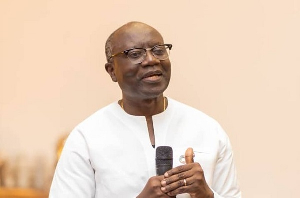Mark Twain once said “there is no distinctly American criminal class, except Congress”. In my beloved Ghana, it may not be farfetched to suggest that there is no distinctly Ghanaian criminal class, except those entrusted with power. Whether it is orchestrated by the politician or the policeman, the bureaucrat or the businessman, the urge to extort bribes for service or disservice rendered to the Ghanaian public is perhaps the most obvious growth-killing incentive that the Ghanaian economy faces.
Last week, Transparency International – the global civil society organization leading the campaign against corruption – lowered Ghana’s mark by four points relative to the previous year. The Mills administration claimed to be ‘saddened’ by the nation’s latest score and so the administration responded by citing several global and domestic anti-corruption initiatives that they have signed on to in order to perhaps justify why they believed the new rating is undeserved.
This week, we are yet again being reminded of the canker of corruption in our vital national institutions with the survey released by the Ghana Integrity Initiative which identified the Ghana Police Service as one perceived to be the most corrupt institution in Ghana. Following closely in their footstep is the Customs Division of Ghana Revenue Authority, the Public Service, Religious Bodies, the media and other non-governmental organizations (NGO’s). These are all institutions of vital importance to our national wellbeing and one with which so much power has been entrusted to advance the elusive quest for socio-economic development in Ghana.
While some Ghanaians have claimed that the corruption perception index is meaningless and of little value to development, this article takes a different position. It does so based on the simple premise that in the 21st century, perception is reality. Nowhere is this aphorism truer than Africa in general and Ghana in particular. One may not necessarily need a scientific research enterprise like Transparency International or the Ghana Integrity Initiative to establish the prevalence of corruption (actual or perceived) in Ghana. Corruption is a common and everyday experience for most ordinary citizens across the land and the people are never shy to voice their disgust about the issue even if they are powerless to do much about it. Whenever I visit Ghana, I make it a point to ask almost every person that I engage with about what they think are the biggest problems facing the country. Incidentally, corruption is almost always in the top tier irrespective of where the opinion is coming from – judges, academics, taxi drivers, janitors, market women, students, the pharmacist or the business tycoon.
Institutions like the Ghana Police Service exist principally to investigate, arrest and deter criminal activity like corruption. Ironically, it is this very institution that is often accused of spearheading corruption in the country. On our roads every single day, the Trotro and Taxi drivers have to play a constant cat and mouse game with elements of the corrupt Ghana police. The drivers are the mouse and the police are the cats. Simple acts like driving a vehicle through a police checkpoint is like having a sign on your forehead that says “I’m a goldmine, please extort bribes from me”. Requiring drivers to pay for a passage on the highway or private business women to pay bribes in order to facilitate movement of goods and services is a direct tax on production, and so we economists will expect it to lower growth. On the other hand, if the perception of the ordinary citizen who wishes to establish a legitimate business is that he will be required to pay off several bureaucrats in order to get a business licence, then the incentive to establish that business is severely diminished. Moreover, if parents have to deliver a thick brown envelope in order to get their precious child into an institution of higher learning, then only the privileged few will benefit from better education.
Ultimately, this is a serious national problem and the end result is often predictable. The vast number of the urban unemployed begin to seek redemption from God, government or both; viewing government as the only instrument for job creation and God as a propagator of manna from heaven. So, rather than individuals creating jobs, everybody is searching for non-existent jobs or waiting for politicians to wave their magic wand of job creation. Where will our Bill Gates and Steve Jobs come from? Where will our Albert Einsteins and Isaac Newtons come from if we have endless people chasing after buses claiming to be prophets, bishops, messiahs etc? Education is suppose to provide the path to analytical thinking but most of our schools are producing students who can only read and recite – ‘chew and pour’, they call it!
Make no mistake: corruption occurs in every country and all regions – African, Asian, European, Middle Eastern or North American. Government officials everywhere are no better than highway men on the road to growth. However, it is often the severity and the nature of corruption - decentralized corruption – the kind that ordinary people witness day in and day out in Ghana that is so detrimental to economic growth and poverty alleviation. Available data from the International Credit Risk Guide have on several occasions shown an inverse relationship between corruption and growth and between corruption and investment ratio to GDP. Most importantly, not only does corruption have a negative effect on growth, it also worsens other policies that affect long term growth. For example, diversion of state funds into private bank accounts and misallocation of funds through kickbacks all have the tendency to worsen the budget deficit and the overall national debt.
Without slipping into technicalities, it must simply be stated that no serious investor will want to invest favourably in a corrupt economy no matter how many investment attraction trips the president takes. As a nation, we will not create wealth if the people entrusted with leadership positions exploit the economy to benefit themselves, or if the police rather than arresting drug traffickers allow themselves to be bought off like common criminals. No foreign investor will want to enter a market where the port authority is rotten to the core. It is the fundamental truth that in this day and age, capable, reliable and transparent institutions are the only proven key to the success that we have been searching for in the last fifty years.
As a country, we are very good at paying lip service to issues and turning everything into a political or tribal football but corruption is one of those issues that we cannot afford to sweep under the carpet. For it is not an NDC, NPP or CPP issue, neither is it Akan, Ewe, Ga, or Dagomba issue, it is a Ghana issue! Therefore, we must join together and find innovative ways of reducing corruption significantly in our country. As citizens, we must continuously demand accountability and competence from those who aspire to positions of leadership. We must not waiver in our commitment to keep drawing our leaders’ feet closer to the fire and expect them to be better managers of the country than their predecessors. After all, most of our problems have been created by Ghanaians therefore they can be solved by Ghanaians!
Frank S. Debrah
Vancouver, Canada
Opinions of Monday, 12 December 2011
Columnist: Debrah, Frank S.


















